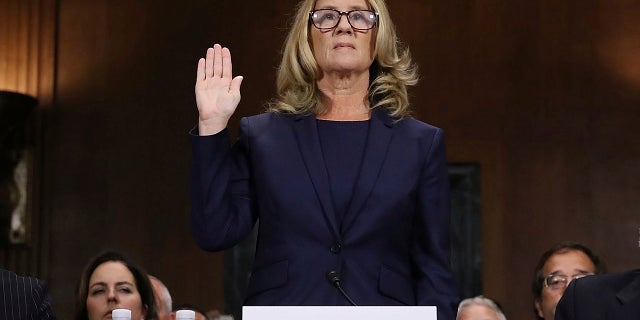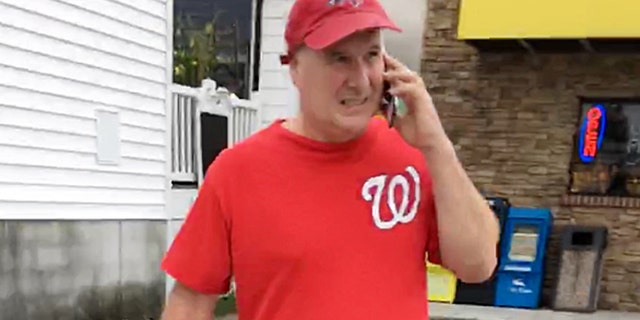In the weeks after Christine Blasey Ford publicly accused Brett Kavanaugh of sexually assaulting her at a party in high school, she was unable to produce any corroborating, contemporaneous witnesses to demonstrate that she had mentioned the alleged assault to anyone -- or even that she had ever met Kavanaugh.
In fact, Ford's friend Leland Keyser would expressly contradict Ford's narrative, saying it "just didn't make any sense." Although Ford claimed Keyser had attended the 1982 party during which the alleged assault occurred, Keyser had no recollection of the event or anything like it, and asserted that it was implausible that Ford couldn't recall how she had gotten home or where exactly the party had occurred. Kavanaugh forcefully denied the accusation.
Nevertheless, Ford's accusation immediately reverberated throughout the nation's political landscape and dominated the coverage of every major media organization. Virtually all Democratic senators called for a serious inquiry, if not Kavanaugh's withdrawal from consideration for the Supreme Court. Later, accusations by Deborah Ramirez and Michael Avenatti client Julie Swetnick, although also uncorroborated, only added fuel to those calls.
Now, more than a month after Tara Reade alleged that Joe Biden sexually assaulted her when she worked for him as a staffer, those same Democrats and media outlets are mostly silent. Reade, however, has presented substantially more corroborating evidence than Ford did when she leveled her claims in 2018.
Biden himself hasn't addressed the allegation against him, and no one in the media has asked him about it during interviews. Representatives for Biden's campaign have denied the allegations.
At the same time, information has surfaced that has led critics to question Reade's story, just as Ford's changing narrative threatened to undercut her testimony.
A review of the evidence follows.
The witnesses - Tara Reade
Jeanette Altimus. Reade's mother called in to CNN's "Larry King Live" on August 11, 1993, during a program titled “Washington: The Cruelest City on Earth?”
King introduced a caller from San Luis Obispo, Calif. The Intercept reported that congressional records "list August 1993 as Reade’s last month of employment with Biden’s Senate office, and, according to property records, Reade’s mother, Jeanette Altimus, was living in San Luis Obispo County."
The call did not explicitly reference Biden or sexual assault, but Reade has said her mother was indeed discussing her experience with Biden:
KING: San Luis Obispo, California, hello.
CALLER: Yes, hello. I’m wondering what a staffer would do besides go to the press in Washington? My daughter has just left there, after working for a prominent senator, and could not get through with her problems at all, and the only thing she could have done was go to the press, and she chose not to do it out of respect for him.
KING: In other words, she had a story to tell but, out of respect for the person she worked for, she didn’t tell it?
CALLER: That’s true.
Lynda LaCasse. Reade's former next-door neighbor, a self-described Biden supporter, came forward this week and spoke on the record with Rich McHugh of Business Insider. "This happened, and I know it did because I remember talking about it," LaCasse said, recalling a conversation with Reade that occurred in either 1995 or 1996.
Lorraine Sanchez. A former co-worker of Reade's also told Business Insider this week that Reade had mentioned the episode, although without referring to Biden by name. "[Reade said] she had been sexually harassed by her former boss while she was in DC," Sanchez told the publication, "and as a result of her voicing her concerns to her supervisors, she was let go, fired."
Collin Moulton and an unnamed friend. Reade's brother has told The Intercept that Reade mentioned the alleged assault at the time. "Both her brother and friend also confirmed Reade had told her mother, and that her mother, a longtime feminist and activist, urged her to go to the police," The Intercept reported.
The New York Times separately reported that Reade told two unnamed friends about the episode -- one at the time, and another in 2008. The paper later stealth-edited its story at the request of the Biden campaign.
Marianne Baker. The former executive assistant in Biden's office and a supervisor who would have received Reade's harassment complaint has come out in defense of Biden.
“In all my years working for Sen. Biden, I never once witnessed, or heard of, or received, any reports of inappropriate conduct, period -- not from Ms. Reade, not from anyone,” Baker said. “I have absolutely no knowledge or memory of Ms. Reade’s accounting of events, which would have left a searing impression on me as a woman professional, and as a manager. These clearly false allegations are in complete contradiction to both the inner workings of our Senate office and to the man I know and worked so closely with for almost two decades.”
Dennis Toner. Biden's former deputy chief of staff. Reade said she had complained about feeling uncomfortable to Toner, but said she did not mention the assault. Toner has called Reade's claim an "outrageous accusation that's totally untrue." He added, “I would remember something like this if it ever came up."
Ted Kaufman. Biden's former chief of staff. He has remarked: “It never came up. And I sure would have remembered if it did.”
The witnesses - Christine Blasey Ford
Leland Keyser. During the Kavanaugh hearings, a lawyer for Keyser told the Senate Judiciary Committee that she "does not know Mr. Kavanaugh and she has no recollection of ever being at a party or gathering where he was present." At the same time, Keyser said she was close friends with Ford since their days at the Holton-Arms all-girls school in Maryland, and believed her accusation.
“It’s not surprising that Ms. Keyser has no recollection of the evening as they did not discuss it," one of Ford's lawyers said. “It’s also unremarkable that Ms. Keyser does not remember attending a specific gathering 30 years ago at which nothing of consequence happened to her. Dr. Ford, of course, will never forget this gathering because of what happened to her there.”
However, in later interviews -- including with Mollie Hemingway and Carrie Severino, as well as The New York Times -- Keyser made clear her doubts about Ford's story ran deeper.

Christine Blasey Ford is sworn in before the Senate Judiciary Committee on Capitol Hill in Washington on Thursday, Sept. 27, 2018. (AP)
“It would be impossible for me to be the only girl at a get-together with three guys, have her leave and then not figure out how she’s going to get home,” Keyser said. She added that she didn't remember parties like the one Ford described, or spending much time with Georgetown Prep students like Kavanaugh, whom Keyser said she didn't recall.
“Those facts together I don’t recollect, and it just doesn’t make any sense,” Keyser said -- but she noted that she had spoken to many people who “wanted me to remember something different."
Hemingway and Severino also reported that Ford's father had supported Kavanaugh's confirmation.
Mark Judge. Ford identified Judge as one of her alleged assailants at the party. A self-described NBC News "hot take" at the time touted Judge as a major piece of potential corroboration.
"If you are still inclined to believe that Ford is lying, ask yourself: Why would she create a defense witness by identifying Mark Judge, who was and still is indisputably a friend of Kavanaugh’s, as being present and participating in this attack?" the hot-take author asked. "Why would she place at the scene an individual who could, because of loyalties to his friend, contradict her account if she were making this up? She wouldn’t."
However, Judge denied Ford's allegation, and he didn't provide any support for her claims. When The Washington Post hunted Judge down at a beach house in Delaware, he said only: "How did you find me?"

Mark Judge is outside a friend's home in the seaside holiday village in southeast Delaware. (Photo by Gabriel Pogrund/The Washington Post via Getty Images)
Details of Judge's memoirs resurface and appear to show his hard-charging, party-heavy lifestyle, including episodes in which he drank and was told he behaved aggressively toward women. The Intercept reported that Kavanaugh's friendship with Judge undercut his clean image -- but didn't help prove that he engaged in a sexual assault with Judge.
Speaking with Fox News, Kavanaugh didn't speak much about his time with Judge. He said: “I was focused on academics and athletics, going to church every Sunday at Little Flower, working on my service projects, and friendship with my fellow classmates and friendship with girls from the local all-girls Catholic schools.”
Ford's ex-boyfriend. In a written declaration obtained by Fox News, Ford's ex-boyfriend directly contradicts her testimony that she had never helped anyone prepare for a polygraph examination.
The former boyfriend also said Ford neither mentioned Kavanaugh nor mentioned she was a victim of sexual misconduct during the time they were dating from about 1992 to 1998. He said he saw Ford going to great lengths to help a woman he believed was her "lifelong best friend" prepare for a potential polygraph test. He added that the woman, Monica McLean, had been interviewing for jobs with the FBI and U.S. Attorney's Office.
He further claimed that Ford never voiced any fear of flying (even while aboard a propeller plane) and seemingly had no problem living in a "very small" 500-square-foot apartment with one door -- apparently contradicting her claims that she could not testify promptly in D.C. because she felt uncomfortable traveling on planes, as well as her suggestion that her memories of Kavanaugh's alleged assault prompted her to feel unsafe living in a closed space or one without a second front door.
Ford "never expressed a fear of closed quarters, tight spaces, or places with only one exit," the former boyfriend wrote.
However, Ford testified: "I was hoping to avoid getting on an airplane. But I eventually was able to get up the gumption with the help of some friends and get on the plane." She also acknowledged regularly -- and, in her words, "unfortunately" -- traveling on planes for work and hobbies.
And Ford explicitly told Sen. Dianne Feinstein, D-Calif., that she had a second front door installed in her home because of "anxiety, phobia and PTSD-like symptoms" that she purportedly suffered in the wake of Kavanaugh's alleged attack at a house party in the 1980s -- "more especially, claustrophobia, panic and that type of thing."
Changing narratives - Tara Reade
Last year, Reade told The Washington Post that Biden had "touched her neck and shoulders but did not mention the alleged assault or suggest there was more to the story," the paper reported.
Reade called Biden “a male of his time, a very powerful senator, and he had people around saying it was okay.” Reade told The Associated Press that Biden had “rubbed her shoulders and neck” and “played with her hair," echoing the accusations of many other women at the time.
However, Reade did not explicitly mention that Biden had penetrated her with his fingers, as she did in a podcast released March 25.
Additionally, Reade said that in 1993 she filed a complaint "with a congressional human resources or personnel office," but again, the complaint referred to harassment at work and not Biden's alleged sexual assault.
Reade has called on Biden to release the records from his 36 years as a senator, which are currently inaccessible to the public and are kept at the University of Delaware.
"I'm calling for the release of the documents being held by the University of Delaware that contain Biden's staff personnel records because I believe it will have my complaint form, as well as my separation letter and other documents," Reade told Fox News on Tuesday. "Maybe if other staffers that have tried to file complaints would come to light -- why are they under seal? And why won't they be released to the public?"
Changing narratives - Christine Blasey Ford
Ford told The Washington Post that there were a total of "four boys at the party" where the alleged episode occurred, and that two -- Kavanaugh and his friend Mark Judge -- had been in the room during her attack. She said that her therapist had made an error by indicating she had told him in 2012 that all four boys had been involved in attacking her. (Ford first mentioned the alleged assault decades later, in 2012 therapy sessions.)
Those boys purportedly included Kavanaugh, Judge, and another classmate, Patrick Smyth -- all of whom have since denied to the Senate Judiciary Committee, under penalty of felony, any knowledge of the particular party in question, as well as any misconduct by Kavanaugh.
Keyser, who has never been describable as "boy," has since been identified by Ford as the fourth witness at the party.
However, in Ford's letter to Feinstein in July 2008, she gave a different tally, writing instead that the party "included me and 4 others." Under oath, Ford for the first time mentioned that a fourth boy was at the party, but that she could not remember his name.
Ford refused to turn over notes from her 2012 therapy sessions in which she claimed to have discussed her alleged sexual assault decades ago. Ford claimed she could not say definitively whether she had shared those notes with The Washington Post just two months earlier, as opposed to describing them abstractly. The Post wrote that it had reviewed a "portion" of Ford's notes.
Motivations - Tara Reade
In 2017, Reade retweeted posts praising Biden's efforts to combat sexual assault.
In 2018, Reade wrote a Medium post unreservedly praising Russian President Vladimir Putin. The post, titled, “Why A Liberal Democrat Supports Vladimir Putin," contains such lines as "President Putin has an alluring combination of strength with gentleness. His sensuous image projects his love for life, the embodiment of grace while facing adversity. It is evident that he loves his country, his people and his job.”
The piece also asserts that “President Putin’s obvious reverence for women, children and animals, and his ability with sports is intoxicating to American women."
Later that year, Reade wrote: "President Putin scares the power elite in America because he is a compassionate, caring, visionary leader.” Notably, Reade writes that she left Washington, D.C. because she was disenchanted with U.S. imperialism and “love[d] Russia with all her heart," although in 2009, she had written that she left D.C. because her husband received a job offer elsewhere.

Russian President Vladimir Putin has a fan in Tara Reade, although her praise for Putin came decades after she reportedly told friends about an alleged sexual assault. (Alexei Druzhinin, Sputnik, Kremlin Pool Photo via AP)
In 2019, Reade continued the praise for Putin: "When the anti-Russia, anti-Putin propaganda starts up, personally, I shut down. I love Russia, I love my Russian relatives and friends. And like most women across the world, I like President Putin… a lot, his shirt on or shirt off."
Reade also defended Putin when a Twitter user mentioned that he apparently kills journalists, asking: "Have you examined objective evidence?"
While the written pieces and tweets came decades after witnesses said Reade first reported Biden's alleged sexual assault, they nevertheless raised eyebrows from critics in the wake of Russian election interference efforts.
Additionally, Reade first made her accusation on a pro-Bernie Sanders podcast. Reade, however, has reposted several articles on Twitter that are favorable to both Biden and Sanders.
Motivations - Christine Blasey Ford
Although Ford left little social media footprint by the time she went public with her allegations, several indicators surfaced that she would not have otherwise supported Kavanaugh's confirmation -- already a hot-button issue, given that it threatened to swing the balance of the court to the conservative side amid tense debates over abortion and other issues.
Ford is a registered Democrat, and her lawyers during the Kavanaugh hearings -- Debra Katz and Lisa Banks -- are longtime Democrat operatives. They were recommended by Feinstein and are longtime contributors to Democrats, ranging from Barack Obama to Hillary Clinton.
Katz was even videotaped attending a left-wing rally and yelling, “We are going to resist. We will not be silenced.”
In 2019, Katz admitted that Ford was motivated to come forward in part by a desire to tag Kavanaugh's reputation with an "asterisk" before he could start ruling on abortion-related cases.
In comments at the University of Baltimore’s 11th Feminist Legal Theory Conference, entitled "Applied Feminism and #MeToo," Katz stated: “In the aftermath of these hearings, I believe that Christine’s testimony brought about more good than the harm misogynist Republicans caused by allowing Kavanaugh on the court. ... He will always have an asterisk next to his name. When he takes a scalpel to Roe v. Wade, we will know who he is, we know his character, and we know what motivates him, and that is important."
"It is important that we know, and that is part of what motivated Christine," Katz said.
Fox News' Joseph Wulfsohn contributed to this report.
"case" - Google News
April 29, 2020 at 02:01AM
https://ift.tt/2y6wymY
Then and now: How evidence in Kavanaugh case compares with Biden accusation - Fox News
"case" - Google News
https://ift.tt/37dicO5
Shoes Man Tutorial
Pos News Update
Meme Update
Korean Entertainment News
Japan News Update
Bagikan Berita Ini














0 Response to "Then and now: How evidence in Kavanaugh case compares with Biden accusation - Fox News"
Post a Comment